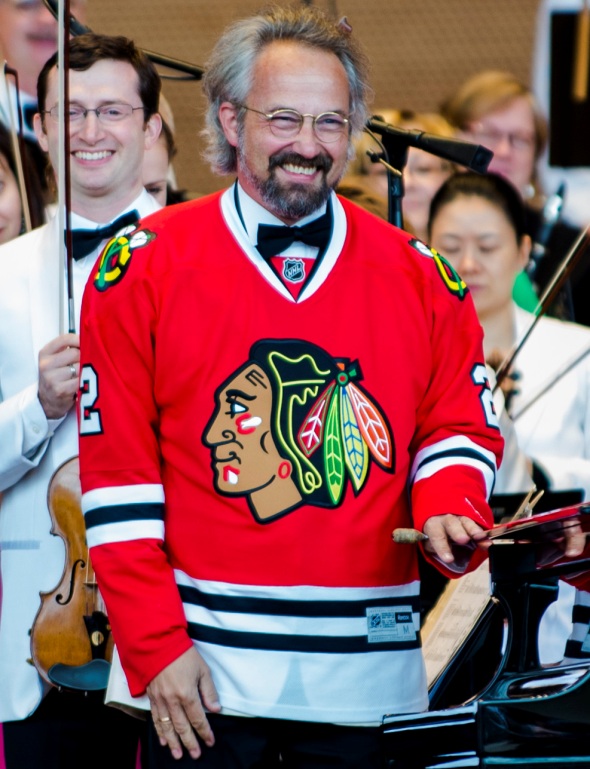Grant Park Orchestra, led by ‘goalie’ Kalmar, heats up Beethoven to kick off festive summer
Review: Grant Park Orchestra conducted by Carlos Kalmar opened the 2015 Grant Park Music Festival at Millennium Park, with pianist Yevgeny Sudbin. The series offers an intriguing mix of music and artists.
By Nancy Malitz
Chicago’s getting everything right at the beginning of this summer season. The day after the Blackhawks won the Stanley Cup, the weather was cool and picnic perfect at Millennium Park, where the free Grant Park Music Festival got underway. Thousands laid down their blankets on the great lawn in front of the Pritzker Pavilion. Even the curse of the overture”Drip” – which was rained out two seasons running – was finally broken.
So it was that conductor Carlos Kalmar’s white tux gained a fashionable topper, the green lawn at Millennium Park was festooned with red and black, and the audience at last heard Los Angeles-based composer Andrew Norman’s amusing five-minute free-for-all “Blip Sparkle Spin Glint Glide Glow Float Flop Chip Pop Shatter Splash” in all its gurgling glory.
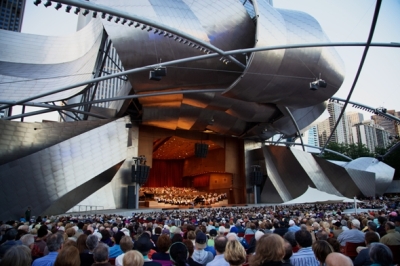 The riotous tune-up, which would get the cobwebs out of any horn, seemed drolly apt for this summer-only orchestra, whose members assembled this week for the first time in 2015 from points all over. The four new musicians joining the group spent their winter season performing with ensembles in Miami, Indianapolis, Minneapolis and Sarasota.
The riotous tune-up, which would get the cobwebs out of any horn, seemed drolly apt for this summer-only orchestra, whose members assembled this week for the first time in 2015 from points all over. The four new musicians joining the group spent their winter season performing with ensembles in Miami, Indianapolis, Minneapolis and Sarasota.
Already Kalmar’s orchestra is coming together, the strings well-balanced among themselves, the rest of the instrumental choirs vigorous if somewhat rough around the edges. Those lucky enough to sit in the first 10 rows of benches near the stage can actually hear a natural acoustic blend unspoiled by too much amplification, and the suspended loudspeakers above the lawn array do a nice job of delivering a rich orchestral sound. Seats in the spotty middle between the front rows and the lawn itself are a challenge in that the instruments at the back of the orchestra can overpower the mix, but some fiddling with the dials is doubtless underway.
City noise and airplanes overhead are part of the normal mix, but they were held harmless by the program’s main event — Beethoven’s Symphony No. 7, which was given a hearty, luxurious reading. The French composer Olivier Messiaen, who was forever mimicking birdsong in his music, would have been fascinated by the avian chorus that joined in with the second movement Allegretto as the sun prepared to set. The effect was remarkably beautiful.
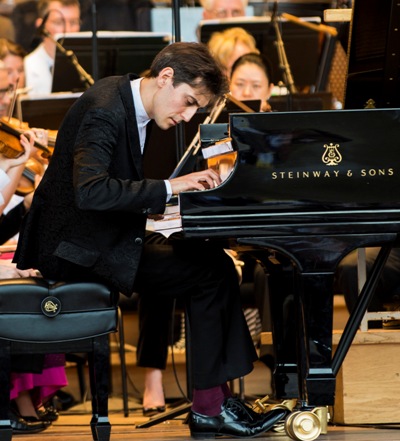 Pianist Yevgeny Sudbin didn’t exactly phone in his solo in the Rachmaninoff Piano Concerto No. 1. He was present in the pavilion. But he was reading his part from music that he had placed inside the piano, and for some long stretches his eyes were glued to the page. The result was that he really wasn’t communicating with the audience, and at those times he seemed just like another member of the orchestra, following Kalmar’s lead.
Pianist Yevgeny Sudbin didn’t exactly phone in his solo in the Rachmaninoff Piano Concerto No. 1. He was present in the pavilion. But he was reading his part from music that he had placed inside the piano, and for some long stretches his eyes were glued to the page. The result was that he really wasn’t communicating with the audience, and at those times he seemed just like another member of the orchestra, following Kalmar’s lead.
Rachmaninoff’s First Piano Concerto isn’t half as popular as the Second, and there are likely reasons why Sudbin wasn’t — to borrow a term from the acting world — completely “off book.” This is a pianist with promising international credentials who has impressed the conductor Osmo Vänskä enough to record the complete Beethoven Concertos with the Minnesota Orchestra, which are underway. I would like to have heard one of those.
Wednesday, Friday and Saturday concerts continue through Aug. 22 and Tuesday through Friday daytime rehearsals — typically at 10:30 or 11 — are also free.
A full chronological list of upcoming Grant Park Music Festival concerts can be found here. The events below – American and otherwise – look particularly intriguing.
 Kenji Bunch has written a big piece for both chorus and orchestra called Symphony No. 3: “Dream Songs,” inspired by Smithsonian Institution research about Native American culture. Bunch also plays viola and bluegrass fiddle, and as a composer has been long active in cutting-edge ensembles such as the Flux Quartet, Ne(x)tworks and fEarNoMusic. Kalmar, who knows him well, says that world premieres are by definition exciting: “Nobody really knows which pieces we are premiering will stay with us for the next 50, 60, even 80 years.” (June 19-20.)
Kenji Bunch has written a big piece for both chorus and orchestra called Symphony No. 3: “Dream Songs,” inspired by Smithsonian Institution research about Native American culture. Bunch also plays viola and bluegrass fiddle, and as a composer has been long active in cutting-edge ensembles such as the Flux Quartet, Ne(x)tworks and fEarNoMusic. Kalmar, who knows him well, says that world premieres are by definition exciting: “Nobody really knows which pieces we are premiering will stay with us for the next 50, 60, even 80 years.” (June 19-20.)
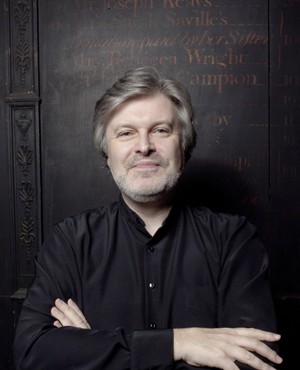 “Quickening,” a vast choral-orchestral work by Scottish composer James MacMillan about conception and the beginning of life, will receive its Midwest premiere and features a children’s chorus representing the unborn child, a quartet of solo male singers and choral writing of great complexity that includes nonsense texts that have to be mastered. “There are certain pieces in the repertoire that seem to have Grant Park written all over them, and this is one,” says Kalmar. The Grant Park Chorus, directed by Christopher Bell, numbers more than a hundred and routinely performs challenging works requiring extended forces. “I remember talking to (former Chicago Symphony artistic administrator) Nick Winter about it, and he said he was envious because it was the type of work that’s expensive to perform and that puts a big orchestra in a tricky spot if they have to sell tickets for it.” Lawn listeners, by contrast, tend to be quite open to free discoveries. (June 26-27.)
“Quickening,” a vast choral-orchestral work by Scottish composer James MacMillan about conception and the beginning of life, will receive its Midwest premiere and features a children’s chorus representing the unborn child, a quartet of solo male singers and choral writing of great complexity that includes nonsense texts that have to be mastered. “There are certain pieces in the repertoire that seem to have Grant Park written all over them, and this is one,” says Kalmar. The Grant Park Chorus, directed by Christopher Bell, numbers more than a hundred and routinely performs challenging works requiring extended forces. “I remember talking to (former Chicago Symphony artistic administrator) Nick Winter about it, and he said he was envious because it was the type of work that’s expensive to perform and that puts a big orchestra in a tricky spot if they have to sell tickets for it.” Lawn listeners, by contrast, tend to be quite open to free discoveries. (June 26-27.)
- Elgar’s oratorio “The Kingdom,” another blockbuster choral-orchestra extravaganza (1906) follows the lives of Jesus’ disciples. Soloists include some of the festival’s biggest name singers of the season — soprano Erin Wall as the Blessed Virgin, mezzo-soprano Jill Grove as Mary Magdalene, tenor Garrett Sorenson as St. John and baritone Brian Mulligan as St. Peter. The oratorio itself is rarely done, but it is noted in particular for a setting of the Lord’s Prayer and for the depiction of the disciples’ empowering vision at Pentecost. (Aug. 21-22.)
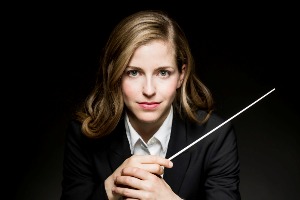 Two promising young conductors will make their first appearances – the rising American Karina Canellakis, currently in her first year as assistant conductor at the Dallas Symphony, and the German Christoph König, who holds positions in Galicia (Spain) and Luxembourg. “These are fresh faces for us,” Kalmar says. “I tell you a little bit of reality, the great thing is that we have the wonderful Chicago Symphony and Riccardo Muti, who is really terrific, and they can go after the very big names and get whoever they want. But we normally work only nine months to a year and a half in advance in planning and so we are sometimes fortunate to be able to get some of these new artists sooner.” (Canellakis, July 8; König, July 31-Aug. 1.)
Two promising young conductors will make their first appearances – the rising American Karina Canellakis, currently in her first year as assistant conductor at the Dallas Symphony, and the German Christoph König, who holds positions in Galicia (Spain) and Luxembourg. “These are fresh faces for us,” Kalmar says. “I tell you a little bit of reality, the great thing is that we have the wonderful Chicago Symphony and Riccardo Muti, who is really terrific, and they can go after the very big names and get whoever they want. But we normally work only nine months to a year and a half in advance in planning and so we are sometimes fortunate to be able to get some of these new artists sooner.” (Canellakis, July 8; König, July 31-Aug. 1.)
- Stephen Sondheim’s many Broadway hits will be on tap when Paul Gemignani, a longtime Sondheim collaborator, helps celebrate the composer’s 85th birthday with hits from “Into the Woods,” “Sweeney Todd,” “Merrily We Roll Along,” “Company,” “Follies” and “Sunday in the Park with George.” (July 10-11.)
 Computer and video gamers will recognize fantastical segments from the soundtracks of “Sid Meier’s Civilization IV” and “Harry Potter and the Chamber of Secrets” in John Adams’ hair-raising masterpiece from 1985 – “Harmonielehre.” It’s a deeply affecting work that some have called Adams’ “postmodern” response to Wagner, Sibelius and Mahler, because it brashly mocks the past even as it assimilates it. Adams’ roots are minimalist, and fans of minimalist music will love this score, but aficionados of late romantic music are likely to feel just as much at home. It’s an event for multiple generations. (Aug. 7-8.)
Computer and video gamers will recognize fantastical segments from the soundtracks of “Sid Meier’s Civilization IV” and “Harry Potter and the Chamber of Secrets” in John Adams’ hair-raising masterpiece from 1985 – “Harmonielehre.” It’s a deeply affecting work that some have called Adams’ “postmodern” response to Wagner, Sibelius and Mahler, because it brashly mocks the past even as it assimilates it. Adams’ roots are minimalist, and fans of minimalist music will love this score, but aficionados of late romantic music are likely to feel just as much at home. It’s an event for multiple generations. (Aug. 7-8.)
Tags: Andrew Norman, Carlos Kalmar, Christoph König, Grant Park Music Festival, James MacMillan, John Adams, Karina Canellakis, Kenji Bunch, Stephen Sondheim, Yevgeny Sudbin

